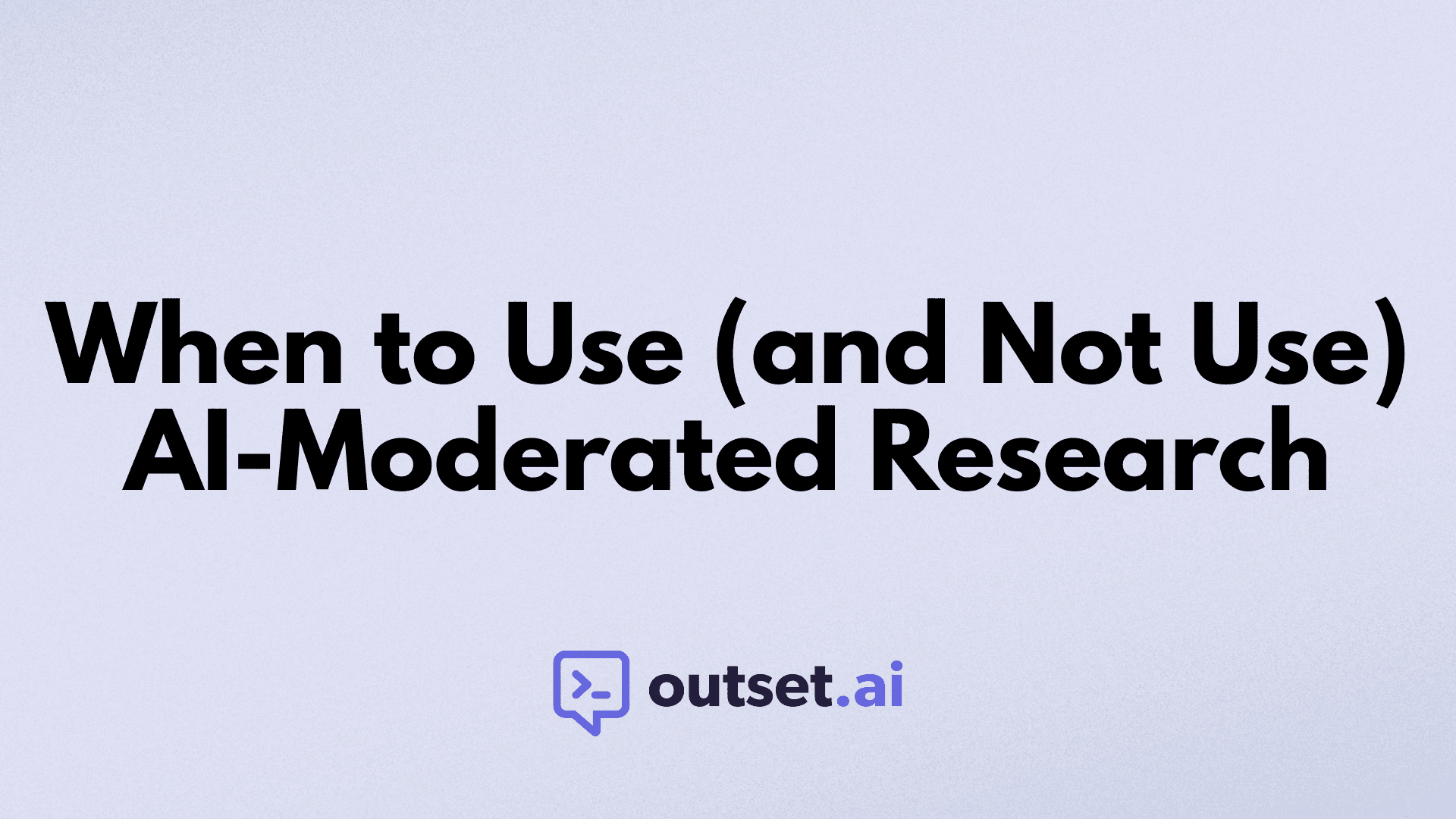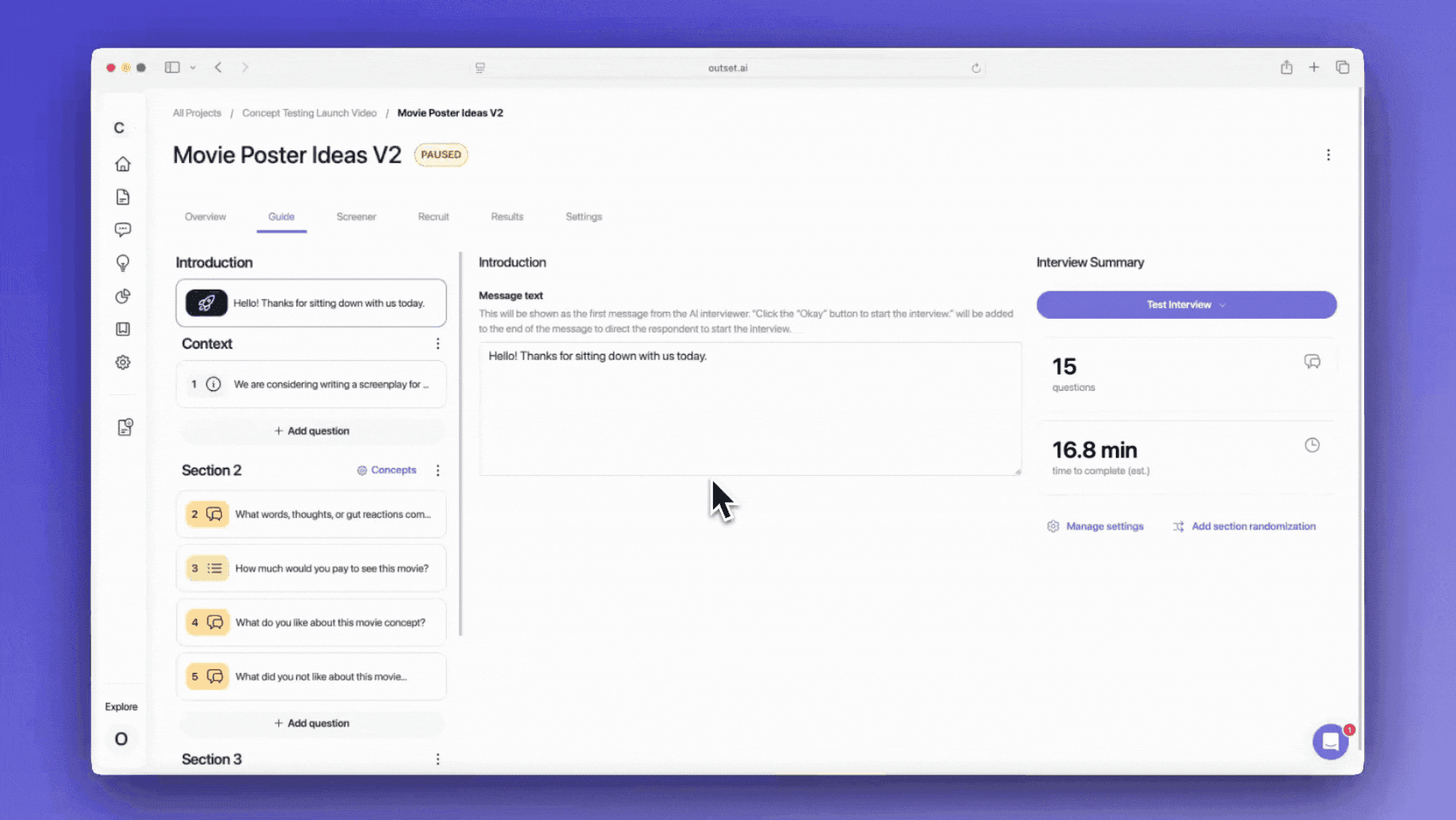Guides
When to Use (and Not Use) AI-Moderated Research
Jul 28, 2025
—

Aaron Cannon
What Makes AI-Moderated Research Different?
Research teams are at a crossroads. On one hand, they see AI unlocking insights at a scale and speed that traditional methods can’t match. On the other, they're grappling with a fundamental question: will automation flatten the nuance that makes research truly valuable?
The hesitation is understandable. While McKinsey reports that 78% of organizations are now using AI to enhance their operations, many research leaders remain unsure if it fits into their workflows.
The questions we hear from them most often are:
Can AI deliver the same depth as a human?
Will it miss what really matters?
And most importantly: When should we use it?
The answers aren’t all straightforward. What we can confidently say is that AI isn't a replacement for human researchers. But when used strategically, it helps teams move faster, go deeper, and do more with less. The key is knowing where it adds value and where human judgment still matters most.
When Will AI Drive Better Research Outcomes?
When You Need Depth at Scale
Research typically forces a trade-off: you can either go deep with a small group or gather broad insights from many participants, but rarely both. AI-moderated research changes that.
Take Nestlé. They needed to quickly test over 100 product concepts across multiple countries and languages. Their brand teams provided Outset with the concepts and consumer target criteria, and AI did the rest—screening participants, conducting interviews, and synthesizing the results into a mix of quantitative metrics and the qualitative reasons behind them.
“We were very impressed with how much depth people shared with the AI moderator—it was more than twice as much as our next best method.” — Michael Widenmeyer, Consumer Insights Sr. Manager at Nestlé
When Speed is Critical
In fast-moving markets, research timelines can make or break product launches. That’s where AI’s speed is a game changer.
WeightWatchers exemplifies this advantage. To better serve their members, they needed to understand consumers’ base-level motivations to get healthy. But previous surveys were too surface-level, and in-depth interview projects required more time and resources with minimal gain.
In partnership with Outset, WeightWatchers ran a series of AI-moderated interviews with 100 people in just 24 hours, which saved 1-2 weeks and allowed them to make critical business decisions while the insights were still fresh and actionable.
“We saw an opportunity to collect richer data, at scale, than we otherwise would be able to collect on our own.” — Wilson Readinger, Head of UX Research at WeightWatchers
When You're Resource-Constrained
Most research teams are stretched thin, with more demand for insight than they can supply. AI helps close that gap.
Away is a perfect example of doing more with less. Ahead of their biggest launch to date, they needed to better understand customer preferences around luggage materials but were restricted by a one-person UX team.
Through AI-moderated research, Away conducted 78 in-depth interviews in just one week, providing rich, qualitative insights that they incorporated into their product launch strategy.
“We’ve been able to achieve both scale and speed in our consumer research. Thanks to Outset, we quickly obtained valuable feedback on our Softside luggage, which allowed us to create content that truly resonated with our customers.” — Jennifer Lien, Senior UX Researcher at Away
When You're Tackling a Backlog
Every research team has lower-priority projects that would provide valuable insights but never quite make it to the top of the queue. AI helps teams get to them without diverting resources from more important work.
Researchers can do more with minimal lift, like conducting user interviews that would’ve otherwise stayed on the backlog but can inform long-term strategy or validate assumptions. AI-moderated research provides an opportunity to expand your coverage and deliver insights across more projects, without burning out your team.
When is AI Not the Right Fit?
When Human Rapport is a Priority
AI excels at more structured conversations, but it can't replace the human intuition needed for emotionally sensitive or long-form engagements. When the ongoing relationship between researcher and participant is paramount, human moderators remain essential.
When Research is Highly Improvised
AI-moderated research works best with a discussion guide and defined goals. While AI can adapt and follow conversation threads, research with little to no structure that requires considerable improvisation and may go down unexpected rabbit holes is still better suited for human researchers.
When Speed or Scale Don’t Matter
If you're interviewing five customers to understand a niche workflow, AI might not add much. Use it as a strategic tool when it adds real value, not for the sake of using the technology.
AI Provides Augmentation, Not Replacement
It's Not Either/Or
The most successful research teams aren't choosing between AI and human researchers, they're strategically combining both. Some teams start with a few traditional interviews to understand the landscape, then scale those learnings with AI-moderated research to validate findings across hundreds of participants.
That hybrid approach plays to the strengths of each method. Humans drive the creative strategy, and AI tests, refines, and repeats at scale.
Humans Drive the Insight
Even when AI handles moderation and synthesis, humans always remain the decision-makers. They understand the internal context of a company and use it to design the study, ask the right questions, and connect the dots. AI supports that process by reducing the manual lift, so teams can spend more time on building impactful narratives that drive decisions.
Choose Wisely, Research Better
AI isn't replacing researchers. It's enabling them to do things that were never possible before. It unlocks insights that research teams wouldn’t otherwise have the time or resources to uncover, but it's not the right solution for every project.
Use it where it adds real value, for things like:
Combining qualitative depth with quantitative validation
Speed-dependant research
Scaling the work of a small team
Getting through the backlog
<Download the Ultimate Guide to AI-Moderated Research> to dive deeper into how AI-moderated research works and how to integrate it into your workflows.
About the author

Aaron Cannon
CEO - Outset
Aaron is the co-founder and CEO of Outset, where he’s leading the development of the world’s first agent-led research platform powered by AI-moderated interviews. He brings over a decade of experience in product strategy and leadership from roles at Tesla, Triplebyte, and Deloitte, with a passion for building tools that bridge design, business, and user research. Aaron studied economics and entrepreneurial leadership at Tufts University and continues to mentor young innovators.
Interested in learning more? Book a personalized demo today!
Book Demo






